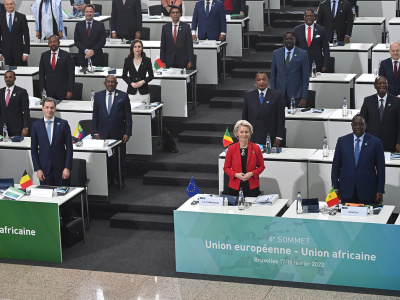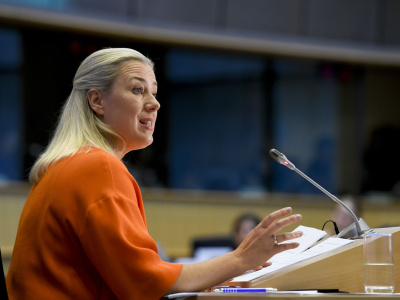
Episode 5 - What is blocking cities from being inclusive and resilient?
What is blocking cities from being inclusive and resilient?
The Middle East and North African (MENA) region has the highest percentage of people living in urban areas. It is also one of the most climate-vulnerable regions in the world. With the region’s population set to double by 2050, and the worsening of the climate crisis, cities must take action to meet their populations’s changing needs. However, historically, cities have been designed and shaped by men, excluding women’s and girls’ needs and priorities. Can we plan and build truly inclusive cities? Can gender equality be promoted as we aim for more climate-resilient cities? And what are the main challenges to these aspirations?
In our fifth and last episode of ECDPM’s podcast series ‘Minding the gap: conversations on gender, Hanne Knaepen speaks with Giulia Maci, gender specialist at Cities Alliance (UNOPS) leading the work in the MENA region. They talk about gender-sensitive climate action in cities and learn how women empowerment, climate action, and urban development are interlinked.
About the guest
Giulia Maci is a gender specialist at Cities Alliance (UNOPS) who leads their work on the MENA region. She is an international urbanist, lecturer and programme manager on the topics of cities, women empowerment and sustainable development. Giulia’s work over the past decade has focused on leading innovative strategies to create inclusive cities, now implemented in more than 20 countries.
Listen to the episode
The views expressed in this episode are those of the author and guest and not necessarily those of ECDPM. This episode was recorded before the most recent outbreak of aggression in the Gaza strip in October 2023.
Episode breakdown
01:15 - What does Cities Alliance do?
02:36 - How the climate crisis affects women and men differently
03:50 - Vulnerable but community leaders
06:02 - Climate crisis, migration and urbanisation come together in the MENA region
08:45 - There is no one solution for the whole MENA region
10:35 - Understanding women's specific vulnerabilities AND contributions
12:23 - Involving women every step of the way in Nepal
14:07 - Making women visible in the public space
16:04 -Advocacy at the global level
17:05 - Collaboration across cities, across borders
18:56 - Development work is becoming humanitarian work?
20:26 - The importance of having the time to reflect and having partners like ECDPM
22:50 - Can we scale up success stories?
25:22 - Funding for mitigation, security and migration - what about gender?
Previous episodes
-
Are we critical enough of gender expertise?
In the first episode of the series, Kawsar Laanani and Maëlle Salzinger navigate key tensions and obstacles around the concept and practice of gender expertise. Drawing from their own experiences and using an intersectional feminist perspective, they delve into the rising presence of gender experts in international cooperation and offer insights on how we can collectively do better to advance gender equality.
Find more information about this episode, including some recommended readings from the hosts, here.
-
Why is it difficult to engage boys and men in the fight for gender equality?
In the second episode of ECDPM's podcast series 'Minding the gap: conversations on gender', Karim Karaki talks to gender expert Carla Pagano about the role boys and men play in supporting or undermining gender equality. Drawing on Carla's over 20 years of experience, they explore why it is important to involve them in gender equality efforts and provide practical examples of how this is already being done. They also delve into how patriarchal structures can negatively affect men.
Find more information about this episode, including some recommended readings from the host and guest, here.
-
How can we advance gender equality and food security in Africa?
In the third episode of ECDPM's podcast series 'Minding the gap: conversations on gender', Cecilia D'Alessandro talks to Dr. Debisi Araba, a member of the Malabo Montpellier Panel. Drawing on the recently released report “BRIDGING THE GAP: Policy Innovations to Put Women at the Center of Food Systems Transformation in Africa”, they zoom in on the experience of four African countries that have made significant strides in empowering women and ensuring their active involvement in food systems.
Find more information about this episode, including some recommended readings from the host and guest, here.
-
Why is it difficult for women to access justice?
In the fourth episode of ECDPM's podcast series 'Minding the gap: conversations on gender', Sara Gianesello talks to Houda Zekri, Moroccan gender expert, and Stephanie Willman Bordat, a founding partner at MRA - Mobilising for Rights Associates, based in Rabat. They delve into the Moroccan justice system to shed light on the challenges and obstacles that women face when seeking justice.
Find more information about this episode, including some recommended readings from the host and guest, here.
About the podcast series
'Minding the gap: conversations on gender' is ECDPM's podcast series entirely devoted to shedding light on topics in which gender is often overlooked, but where promising lessons are emerging.
Who is a gender expert? Why is it important to engage men and boys in fighting for gender equality? How are women empowerment, climate action, and urban development interlinked?
Throughout the episodes, you will hear from researchers, activists and experts working in Europe, Africa and the MENA region to gain insights into what we can collectively do to build a society based on gender equality.
Recommended readings
For a deep dive into this topic, Hanne recommends the following work:









